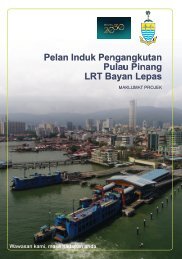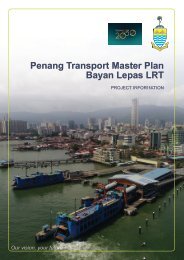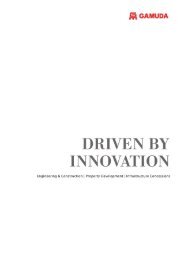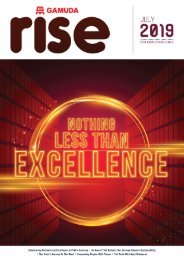Gamuda Rise_SEPT19 (Online)
A newsletter for Gamudians
A newsletter for Gamudians
You also want an ePaper? Increase the reach of your titles
YUMPU automatically turns print PDFs into web optimized ePapers that Google loves.
SEPTEMBER<br />
2019<br />
FOR EMPLOYEES ONLY<br />
CAPACITY<br />
CAPABILITY<br />
COMPETITIVENESS<br />
Providing Clean Water for Orang Asli | Going the Distance with <strong>Gamuda</strong> Land, Digital IBS and BIM<br />
| What SAP ARIBA is All About | GET Scored for Innovation in English Assesment | Teh Tarik with Sudevan
SUSTAINABILITY IS MORE THAN SAVING THE ENVIRONMENT<br />
FROM THE GROUP<br />
PROCUREMENT OFFICE<br />
Ir Chan Kong Wah<br />
Group Director<br />
I<br />
n <strong>Gamuda</strong>, we strive towards strategic<br />
procurement where the returns and savings<br />
can be maximised through the process of<br />
planned purchasing. It is very structured with<br />
the primary objective of improving transparency,<br />
driving the culture of procurement planning and<br />
good corporate governance. The benefits include<br />
having traceable audit trails and leveraging on bulk<br />
purchases. This is opposed to buying on an ad hoc basis<br />
or as when necessary.<br />
For the purpose of clarity, “procurement” is the process of<br />
acquiring goods or services on agreed terms and conditions,<br />
via tendering, competitive bidding and negotiation.<br />
It facilitates business entities in obtaining the best possible<br />
prices and promotes fair competition, while minimising the<br />
risks of fraud and collusion under conditions of scarcity and<br />
price fluctuations. Therefore, buying from the correct source<br />
at the right price and at the right time is crucial.<br />
The SAP Ariba e-procurement system was implemented<br />
in October 2018, as part of our 3Cs (Capacity building;<br />
Capability development; Competitiveness) business<br />
strategy to move up the value chain. Planning ahead<br />
with technology for the construction industry is the next<br />
big step, where technology will have a huge impact on<br />
how contracts can be negotiated fairly and efficiently.<br />
With good governance in the e-Procurement processes,<br />
we can pre-plan and drive transparency. Our initial outlay<br />
of approximately RM7.2 million is fully recouped in less than<br />
three months since Ariba went “live” on 1 October 2018.<br />
To date, over 700 auction events have been conducted with<br />
savings exceeding RM140 million. More foreseeable savings<br />
will be realised with upcoming auction events for bigger<br />
contracts.<br />
Going into the next phase, we are expecting 100% adoption<br />
of all our e-Procurement through Ariba and BuildSpace by<br />
the end of January 2020. This strategy aims to reposition<br />
<strong>Gamuda</strong> towards achieving sustainable competitive<br />
advantage. The next target under this digital platform<br />
is enabling cost data analysis and reporting in a faster,<br />
more efficient manner. Hence, we can expand our base<br />
of suppliers, increase effectiveness and strengthen our<br />
market presence.<br />
Moving forward, our procurement strategy is focused<br />
on building strategic partnerships with key suppliers,<br />
contractors and consultants. This will ensure that for a<br />
particular work package tender, we can secure the contract;<br />
produce added value; and deliver the project on time and<br />
within budget. As a Group, we must continue with a<br />
transparent, digital procurement system as we attract<br />
more suppliers into the supply chain and collaborate<br />
with strategic partners to increase our margins, as well<br />
as effectively manage risks. We can gain market confidence<br />
by attracting more local and overseas suppliers into the<br />
supply chain.<br />
I<br />
t has been two good years since we, collectively<br />
as a Group, set sail on a journey of sustainability –<br />
progressively documenting and reporting our<br />
green efforts, and learning along the way. You<br />
may not realise, but the sustainability values<br />
are already embedded in our DNA given that<br />
consideration of the environmental and social<br />
aspects have always been mandated in the Group’s business<br />
plan, beyond its economic growth – this is fundamentally<br />
the Environmental, Social and Governance (ESG) framework.<br />
Popular buzzwords like climate change, carbon footprint,<br />
greenhouse gas (GHG), single use plastics, and renewable<br />
energy are constantly talked about and flashed all over the<br />
place, but how much do we understand about these terms?<br />
And the biggest question remains, why should we be<br />
concerned? To answer the latter question, we have to look<br />
at what we do.<br />
Our business cuts across infrastructure and property<br />
development. At every life cycle of a project – from<br />
its planning, designing, construction, operation to<br />
decommissioning – the impacts are inter-related and<br />
cumulative. With sustainability in mind, the whole process<br />
can be optimised in its economic (e.g. cost), environmental<br />
(carbon footprint) and social (stakeholder management)<br />
matters.<br />
Significant improvements can be made especially at the<br />
beginning stages of planning and designing. This is where<br />
we, as Gamudians, have an important role in shaping the<br />
policies and processes with our thinking and particularly<br />
consciousness in maintaining sustainability. Such influence<br />
also applies in the operational stages and in dealings with the<br />
wider supply chain which eventually determines our impact<br />
to the societies that we are building and living in.<br />
Most importantly, we must recognise that every action we do<br />
today, will have implications to the world and subsequently,<br />
impact our children’s generations too. As we expand our<br />
Group’s businesses regionally and globally, it must be<br />
complemented with increased efforts towards climate<br />
action, to strengthen climate resilience into the planning<br />
of our projects.<br />
While the Group has been aligning its agendas to all 17 of<br />
the United Nation Sustainable Development Goals (UN SDG),<br />
we will remain focused on delivering SDG 9 (Industry,<br />
Innovation and infrastructure), SDG 11 (Sustainable Cities<br />
and Communities) and SDG 13 (Climate Action). These three<br />
goals are substantial and most relevant to us because our<br />
Gamudian core value stems from driving innovation in<br />
construction technologies and customer solutions.<br />
We are poised in the right direction, and will surely intensify<br />
efforts in sustainability moving forward. For this, we need<br />
concerted and coordinated actions from every member<br />
of the Group to be on board. Stay tuned for workshops,<br />
educational and policy formulation sessions related<br />
to sustainability as we prepare to equip our talents with<br />
the right mindset.<br />
Let us embrace sustainability as part of our lifestyle and<br />
workstyle, together.<br />
| SEPT 2019 | 02<br />
| SEPT 2019 | 03
Finding the Sweet Spot amongst Various Business Demands<br />
Providing Clean Water for Orang Asli<br />
Having joined <strong>Gamuda</strong> Land around 13<br />
years ago, Tang Meng Loon, who is the<br />
Director of Club, Township and Property<br />
Management, has expanded beyond his<br />
role of managing <strong>Gamuda</strong>’s golf and<br />
recreational clubs to include property<br />
and facility management. He now<br />
oversees three major divisions comprising Club Operation<br />
for Kota Permai Golf and Country Club, Horizon Hills GCC,<br />
Botanic Resort Club and Jade Hills Resort Club; Property<br />
Management for up to 11 townships; as well as Facility<br />
Management for <strong>Gamuda</strong> Walk, Quayside Mall, Q Tower,<br />
and Water Front Village.<br />
In juggling with so many portfolios, Tang revealed recently<br />
some of the challenges faced in his current role of managing<br />
the varied expectations of club members, residents, tenants<br />
and the public at large.<br />
Besides upgrading structures and maintaining the pristine<br />
greens in the golf courses, he has to keep up with the high<br />
expectations of the club members in providing top-notch<br />
facilities. At times, it takes dedication and extraordinary<br />
service levels attending to the needs of guests, coupled<br />
with balancing between hosting corporate golf tournaments<br />
and ensuring course availability for its members’ privilege.<br />
Tang and his KPGCC club management team<br />
Tang and his township management team<br />
Interestingly, in managing expectations of buyers and<br />
residents in townships, as well as tenants and visitors at<br />
commercial buildings, the safety and security of these<br />
groups must be prioritised. This is in addition to ensuring<br />
the smooth operation of gated and guarded townships,<br />
as well as residential and commercial high-rise buildings.<br />
“For instance, the advent of Airbnb has made our job<br />
even more challenging. We find ourselves having to<br />
deal with conflicting expectations from different groups<br />
of buyers – those who purchased their units for investment<br />
versus those who use for own stay. But all this must be<br />
handled tactfully,” Tang shared during an interview at<br />
his office.<br />
With much on his shoulder, Tang has managed to<br />
overcome these expectations with his committed team.<br />
His management style can be described as inspirational<br />
and charismatic, striving to build team work and a sense<br />
of belonging among those under him. The many prestigious<br />
international awards won by GL clubs and townships have<br />
also been a great source of motivation for him to continue<br />
striving for excellence.<br />
Valencia Clubhouse<br />
Valencia offers a private residents-only golf course<br />
and clubhouse in a luxurious resort setting.<br />
With the focus on Smart Cities, he is taking a step further and<br />
envisions leading a transformative and exciting Smart Club<br />
in the country that will cater for a broader array of health,<br />
recreational and wellness offerings. This can be seen in the<br />
development of a Wellness Centre in <strong>Gamuda</strong> Gardens. It will<br />
have a full range of facilities similar to a recreational club, but<br />
with the addition of fitness equipment.<br />
Moving forward, Tang will be fostering collaboration to host<br />
more engaging activities that appeal to a younger audience.<br />
He is also riding the wave of digitalisation by introducing<br />
e-newsletters and mobile applications. The latter is expected<br />
to add value and provide convenience to residents in<br />
managing bookings of the various amenities, as well as<br />
enhancing community living.<br />
T<br />
he frequent water supply disruptions in<br />
Selangor, particularly in the Klang Valley<br />
seem to be a perpetual problem for<br />
Malaysians residing in the state. Apparently<br />
clean water is something we need but take<br />
for granted.<br />
In the district of Gombak, there are people from around 12<br />
Orang Asli villages who are still living remotely without<br />
treated water supply. These indigenous communities have<br />
no choice but to pipe water from rivers or wells and risk<br />
suffering from water-borne diseases. The villagers’ hardship in<br />
having access to a basic amenity such as clean water haunted<br />
Teng Yu Mein, a winner of the Star Golden Hearts Award 2018.<br />
It was a lightbulb moment when Teng designed a simple yet<br />
practical pump that connects to a ceramic filter, as a portable<br />
solution to filter water for these marginalised communities.<br />
She later established the Efinity Social Enterprise to sustain<br />
efforts of distributing the water cap filters to those in need.<br />
As part of Yayasan <strong>Gamuda</strong>’s Corporate Social Responsibility<br />
(CSR) initiative of improving the living standards of local<br />
communities, the foundation is sponsoring the installation<br />
of Efinity EZ Water Cap filters for the Orang Asli settlements<br />
in Gombak. It is in tandem with the United Nations’ Sixth<br />
Sustainable Development Goal (UN SDG 6) of ensuring<br />
everyone has access to clean water and sanitation. We<br />
spoke to three <strong>Gamuda</strong> volunteers who were there to help.<br />
“It was meaningful as I realise that there are still people who<br />
have no access to this fundamental necessity which all of us<br />
take for granted. It is also upsetting to know that there are<br />
certain groups of people being left out due to rapid<br />
development, despite living so close to the capital city of<br />
Kuala Lumpur.”<br />
James Ong<br />
Executive, Internal Audit<br />
“I just feel great to see happy faces. The act of giving is a great<br />
way to make people happy because it means we care for them.<br />
I think the provision of the water filter will be very helpful for the<br />
Orang Asli as I can see it will improve their quality of life. Now,<br />
they can have clean water for drinking, cooking and washing<br />
without compromising their physical health.”<br />
Nurul Syuhadah<br />
Secretary, Business Development<br />
“Anyone can be in a position to help those in need, to alleviate<br />
the struggles of the less fortunate in a civil society. For <strong>Gamuda</strong><br />
to initiate this and other charitable efforts, it shows commitment<br />
to giving back to our society, with a focused plan to ensure<br />
continued, sustainable and empowering assistance.”<br />
Arief Fauzy<br />
Coordinator, Yayasan <strong>Gamuda</strong><br />
Yayasan <strong>Gamuda</strong> is privileged to support an invention that<br />
will have a positive and long-lasting impact in improving<br />
the lives of rural communities. As a nation builder, it will<br />
continue to drive efforts on providing educational aid<br />
and community enhancement.<br />
| SEPT 2019 | 04<br />
| SEPT 2019 | 05
GOING THE DISTANCE WITH GAMUDA LAND, DIGITAL IBS and BIM<br />
According to Aw, Malaysia is relying a lot on foreign labour<br />
which is not sustainable and seems to have protected<br />
industries from moving into more effective machine<br />
technology. <strong>Gamuda</strong> is upskilling the local graduates and<br />
skilled workers with better qualifications and the technology<br />
it has to improve productivity. Therefore, the company is<br />
helping the government’s cause of moving towards a<br />
high-income nation by improving productivity, which can<br />
only happen by embracing technology.<br />
He added that <strong>Gamuda</strong> is making inroads with its smart city<br />
initiative, having signed up with Maxis as its first 5G partner.<br />
The company will be at the forefront in terms of virtual<br />
connectivity to realise its projects in Malaysia and being a<br />
differentiator itself.<br />
Learning from Mark Bew, the UK leading expert on BIM<br />
Devendran shared that <strong>Gamuda</strong> can learn from Mark’s<br />
intrinsic wealth of knowledge and experience in how<br />
technology and data-driven design can effectively achieve<br />
sustainable growth, increase value and reduce costs in<br />
construction. Compared to the UK, the BIM maturity level in<br />
Malaysia, its adoption rate amongst builders, consultants,<br />
authorities and effective use still have a long way to go.<br />
Through lessons learnt from its application in the UK, the<br />
problems they faced and the solutions adopted, there is an<br />
opportunity for us to learn and adopt best practices to<br />
mitigate the same issues here. Undertaking such an<br />
endeavour requires a holistic change, and in some cases, a<br />
complete revamp in the way we work, collaborate, share and<br />
utilise information, with a keen understanding on how this<br />
impacts the future of the built environment we live in.<br />
Digitalisation of property development<br />
Synergy between <strong>Gamuda</strong> Land and <strong>Gamuda</strong> Engineering:<br />
Tan Ek Khai, General Manager of <strong>Gamuda</strong> Engineering with Devendran (left), Aw (second from right) and Ngan (right).<br />
Having already adopted the Building<br />
Information Modelling (BIM) and digital<br />
Industrialised Building Systems (IBS) in<br />
its development projects, <strong>Gamuda</strong> Land<br />
is positioning itself in the property market<br />
as a future forward developer. During a<br />
candid interview, the Chief Executive<br />
Officer of <strong>Gamuda</strong> Land - Ngan Chee Meng, Chief Operating<br />
Officer of <strong>Gamuda</strong> Land - Aw Sei Cheh and General Manager<br />
Product Management Unit - Devendran Krishnamoorthy,<br />
shared their views on the company’s BIM and IBS initiatives<br />
and how these technologies are being applied to meet the<br />
housing needs of Malaysians.<br />
“We are providing end-to-end solutions for the housing<br />
industry, having been tasked by the Malaysian government<br />
to play a major role in providing affordable housing in<br />
Malaysia because of our advancement in technology.<br />
This is an important step to help the country in the future,<br />
in line with the Government’s National Housing Policy. It will<br />
put us at the forefront leadership position in the industry. As<br />
to our local projects with digital IBS, we account for a small<br />
percentage of the total overall housing demand in the<br />
country. Almost all our high-rise buildings are using digital<br />
IBS technology,” said Ngan.<br />
Plans in the pipeline for developments using the digital<br />
IBS system<br />
The BIM digital ecosystem allows us to be more rigorous<br />
throughout the whole planning, design to delivery phases,<br />
and utilising the digital tools at our disposal. Information<br />
generated from these processes facilitates more informed<br />
design decisions at a very early stage throughout the various<br />
departments. This provides better speed-to-market<br />
advantages, ensuring timely delivery of high-quality housing<br />
to future home buyers with thoughtful placemaking. The key<br />
focus is on people, process and technology.<br />
The use of digital IBS and BIM for <strong>Gamuda</strong> Land’s<br />
projects on affordable housing<br />
<strong>Gamuda</strong> has the most advanced digital IBS in the country<br />
in our robotics factories. As you know, BIM generates the<br />
3D designs from computer images, which will be used in<br />
the prefabrication of panels and components for our landed<br />
properties and high-rises. We have experimented on this and<br />
actually done that for our high-rise building projects. More of<br />
these models will be rolled out in the next couple of months<br />
which will also include landed units.<br />
<strong>Gamuda</strong> Land is capable of building prefabricated landed<br />
properties. The challenges deterring this adoption are firstly,<br />
it is knowledge- and skill-based in nature. Secondly, it is not<br />
common to find graduates who are trained with the BIM<br />
modules and they only entered the industry about five years<br />
ago. Our end-to-end robotics solutions from the design<br />
stage to assembling at the production site will easily cut<br />
down more than 70% of the labour requirement. We have<br />
proven that it can be done. We are looking at how much<br />
we can help to provide housing for Malaysians in a more<br />
effective manner. The cost of housing per unit will come<br />
down if the scale is big enough. It is how ready the industry<br />
players are.<br />
| SEPT 2019 | 06 | SEPT 2019 | 07
WHAT SAP ARIBA IS ALL ABOUT<br />
GET Scored for Innovation in English Assessment<br />
Mastering English with (from left to right) Gan Ching Ling, Manager of Software Development; Dr Wong Bee Eng, ELU Consultant; Dr Ho Sook Wah, Head of ELU; Professor Barry O’Sullivan,<br />
Head of Assessment Research and Development, English and Exams at British Council; Chang Jian Weng, Assistant Manager of Software Development; and Wong Lye Ling,<br />
Senior General Manager of Group Human Resources and Admin.<br />
T<br />
he advent of Industry 4.0 and the Internet<br />
of Things (IoT) have resulted in the<br />
creation of a global data economy.<br />
Business data have immense value to<br />
corporations and allow faster business<br />
decisions and process automations.<br />
In <strong>Gamuda</strong>, there are four modules under the SAP Ariba<br />
procurement system that were successfully implemented<br />
between October 2018 to April 2019. These are namely,<br />
strategic sourcing; contract management; supplier lifecycle<br />
performance management (SLPM); Procure-to-Pay (P2P).<br />
Strategic Sourcing<br />
Known as e-sourcing, this module handles the Request<br />
For Proposals (RFP), quotation and tender processes. Its<br />
electronic templates support faster requests for information<br />
and quotation, facilitate technical and commercial scoring,<br />
and come with robust e-auction capabilities.<br />
According to Lim Wei Ling, Head of Digital Transformation for<br />
Information Services, the e-sourcing and e-auction functions<br />
will bring about changes of work tasks among employees.<br />
“We use the Ariba system to reduce repetitive work and at<br />
the same time, achieve good governance and transparency<br />
in the procurement processes,” she explains.<br />
Procure-to-Pay (P2P)<br />
P2P is currently used by <strong>Gamuda</strong> Land to support the process<br />
of requisitioning, purchasing, receiving, paying and<br />
accounting for indirect goods and services. With these four<br />
modules in SAP Ariba, the entire Group will comprehensively<br />
deploy this overtime, as digital procurement results in greater<br />
efficiency, savings and transparency.<br />
Contract Management<br />
This component manages commercial and business<br />
transaction contracts in a centralised manner. At a glance,<br />
the company needs to know what are the active contracts<br />
on hand, what are the values, what are the services type in a<br />
more holistic manner. It also needs to monitor and manage<br />
the commitment as well as performance of the company’s<br />
suppliers stated in these contracts.<br />
The online collaboration between suppliers and tenderers<br />
allows them to respond faster and reduce paper work.<br />
<strong>Gamuda</strong> is also changing its procurement approach,<br />
gradually moving away from buying when it needs to plan<br />
and negotiates ahead in the contract, and draws down from<br />
the contract over time. This module comes with templates<br />
and legal clause libraries for the company to build and mature<br />
its commercial contract library, and empower employees to<br />
execute contract without consuming too much time on<br />
hiring legal expertise.<br />
Supplier Lifecycle Performance Management (SLPM)<br />
Here, supplier information is being consolidated centrally,<br />
where suppliers are allowed to self-serve in updating their<br />
company and compliance information in line with <strong>Gamuda</strong>’s<br />
aspiration to achieve higher level of compliance and<br />
sustainability targets. Periodic supplier performance<br />
evaluation can be facilitated and computed by the system in a<br />
much more automated level. Once the company digitalises its<br />
supply chain, it will derive better business intelligence as a<br />
new competitive advantage.<br />
Do you pay attention to using correct and appropriate<br />
sentences and words when you write an email or a<br />
formal document in order to communicate your<br />
message effectively?<br />
English language test for the workplace<br />
needs to match the gaps between the<br />
employees’ language ability and the<br />
required language needs for their job<br />
functions, and also to inform the<br />
development of training syllabus. This is<br />
why a four-person team, led by Dr Ho Sook<br />
Wah, was set up to deliver the in-house <strong>Gamuda</strong> English Test<br />
(GET) from scratch.<br />
For a year plus, Dr Ho worked closely with Dr Wong Bee Eng<br />
from Universiti Putra Malaysia (UPM), who is a linguistic<br />
expert and also the English Language Unit (ELU) consultant,<br />
in analysing work documents and conducting needs analysis<br />
interviews with key stakeholders to design a set of four tests<br />
for the executive (GET-E) and managerial (GET-M (GE/GL/C))<br />
levels. Test questions with a localised flavour to match the<br />
group’s business needs for English were developed after<br />
comprehensive rounds of analysis and research.<br />
Gan Ching Ling and Chang Jian Weng, from our Information<br />
Services department, developed the interactive online<br />
platform for the English assessments. The six-band tests were<br />
designed to provide instant results and personalised<br />
diagnostic reports. The diagnostic reports are an insightful<br />
tool to identify gaps for targeted English training modules,<br />
and to help hiring managers make informed decisions of<br />
prospective employees’ language ability.<br />
For this, <strong>Gamuda</strong> has emerged as the first construction<br />
company in the corporate sector in Malaysia to be awarded<br />
the British Council 2019 Innovation in Assessment<br />
Award. Since its inception in 2013, this global Award<br />
complements the prestigious ELTons Awards in the UK<br />
which celebrates innovation in English teaching.<br />
This award validates <strong>Gamuda</strong>’s effort in setting our<br />
benchmark towards a more English-proficient workforce.<br />
Mooted by Group Managing Director Dato’ Lin who wants<br />
to provide an avenue for employees to improve their English<br />
and make further progress in their career, the ELU offers<br />
sustained and targeted language development training for<br />
staff members.<br />
“The diagnostic report indicates our language strengths and<br />
gaps. With self-awareness of our gaps, we are able to strive to<br />
improve our knowledge on more effective language use. It is<br />
also exciting to receive feedback from some managers that<br />
they have seen improvement in their subordinates’ writing as<br />
a result of the targeted English training,” said Dr Ho.<br />
Conducting diagnostic testing and customised language<br />
training have posed some challenges, but working with the<br />
right team, led by strong leadership and sponsorship from<br />
the top management has made all the difference. A<br />
workforce with the competency to write and communicate<br />
effectively can enhance the company’s brand image.<br />
| SEPT 2019 | 08<br />
| SEPT 2019 | 09
with Sudevan<br />
We as Malaysians and as a nation, have come a long way since independence in 1957. In celebration of our 62nd National<br />
Day on 31 August, <strong>Rise</strong> spoke to Gamudians who see themselves as being part of nation building, to learn about their<br />
aspirations for a better Malaysia! Check out more stories in Workplace.<br />
Abbey Fahmi<br />
(Contracts Manager)<br />
Jasmin Bin Kasim<br />
(General Coordinator)<br />
PMP (Project Management Professional) Project Manager<br />
Sudevan Valyetham, who is involved in the digitisation efforts<br />
for the Penang Transport Master Plan (PTMP), shares his passion<br />
for biking and interest in mapping out blueprints for IT systems.<br />
The turmoil in some parts of the<br />
world reminds me of how lucky<br />
we are today. I really hope that as<br />
Malaysians, we get to understand<br />
and value our differences in<br />
opinion and celebrate our<br />
freedom of speech. Let’s uphold<br />
the peace and stability in our<br />
country!<br />
Aloysies Arrokiam<br />
Nathan<br />
(BIM Manager)<br />
Every decade since 31 August<br />
1957 has been a step forward,<br />
and I am a proud Malaysian for<br />
the boundaries we have pushed<br />
to get to where we are today.<br />
But there is always room for<br />
betterment. As builders who<br />
are often seen as the physical<br />
machinery for development and<br />
progress, we must equate this<br />
with sustainability so that in the<br />
future, we leave behind for our<br />
kids a place where they can live<br />
and thrive.<br />
| SEPT 2019 | 10<br />
What<br />
Do You<br />
Hope<br />
to see this<br />
?<br />
We are widely viewed as a multicultural,<br />
multi-religious society.<br />
Malaysians have been facing long<br />
standing issues relating to social<br />
challenges and of co-existence.<br />
Regardless of the differences in our<br />
cultures and languages spoken, our<br />
diversity is always a blessing and we<br />
must stand united in diversity.<br />
Emelyn Lee Sian Mey<br />
(Document Controller)<br />
Phoster Sageh Anak<br />
George Pandong<br />
(Advertising &<br />
Promotions Manager)<br />
I wish for the next generation to<br />
have access to holistic education,<br />
which focuses on critical thinking<br />
and creativity, and with STEM<br />
subjects conducted in English again.<br />
I also hope to change the negative<br />
perception of most Malaysians<br />
towards mental health and people<br />
with disabilities. We must embrace<br />
inclusivity and celebrate our<br />
diversity.<br />
This Merdeka, I am wishing for<br />
greater connectivity – whether<br />
through interstate travels or moving<br />
about within the city. As someone<br />
born and bred in Selangor, I have<br />
had enough of traffic congestion.<br />
I really hope my children would get<br />
to experience a different Malaysia<br />
where they can rely on MRT and<br />
other public transportation to get<br />
around efficiently.<br />
Commander<br />
Ong Lam Seng<br />
(Head of<br />
Construction<br />
Training)<br />
I envision, for our children, to<br />
see a truly happy and united<br />
Malaysia – where everyone<br />
lives a comfortable life with<br />
employment; where education<br />
and healthcare needs are met.<br />
The government is on the right<br />
track to create more jobs, but I<br />
hope to see more dialogues with<br />
industry players to address the<br />
gaps in driving the nation’s<br />
growth. When the people’s basic<br />
necessities are fulfilled, we will be<br />
on the way to become a united<br />
and progressive country.<br />
Y<br />
ou might be scratching your head,<br />
pondering about what motorcycling<br />
and plotting out information technology<br />
(IT) systems have in common. Actually,<br />
they do. The high-adrenaline sport of<br />
motorcycle racing requires riders to be<br />
extremely focused as they are riding<br />
high-performance motorbikes, continuously adjusting to<br />
different speeds while managing throttle control, controlled<br />
braking, body weight distribution and positioning when<br />
navigating sharp or swooping corners. Designing systems<br />
architecture and implementing software solutions also need<br />
a high level of detail and focus, not to mention the elements<br />
of being technical and methodical.<br />
I can absolutely relate to motorbike racing, even though my<br />
work revolves around developing IT solutions, having studied<br />
Computer Science (majoring in Data Communications) at the<br />
Multimedia University (MMU) in the Melaka campus. The<br />
intrigue with motorcycles began as a child when I was six<br />
years old. I could remember vividly, travelling with my parents<br />
from Kuala Lumpur to my mother’s hometown in Taiping.<br />
A big, loud motorcycle passed our car. Its angular, menacing<br />
looks and noise (resembling the roar of a wild animal)<br />
triggered my fascination for motorcycles since then.<br />
Possessing the curiosity and urge to know what it is like to<br />
ride a motorcycle, the very first bike I rode was a borrowed<br />
Honda C70 “underbone” (better known as “kapchai” in South<br />
East Asia) when I was 16 years old. In less than 100 meters,<br />
I rode it into a drain! Few years later in my early 20s, I took<br />
lessons and learned to ride properly. Nowadays, when I am<br />
not busy running after my two-year old son, I will be riding<br />
my 1000cc ZX10R motorcycle on occasional weekends with<br />
a few friends. I also ride in the Sepang International Circuit<br />
every 2-3 months, which is a much safer and controlled<br />
environment. While riding motorcycles is immensely exciting<br />
and fun, it is not without risks and danger. Safety is always of<br />
paramount importance and thus, it is a must to invest in<br />
appropriate equipment. Proper discipline and road ethics<br />
are equally important to ensure personal safety.<br />
Similarly, when it comes to my work, I have to establish clear<br />
understanding of the business requirements and need for a<br />
particular solution, define the architecture as well as lead the<br />
implementation (project management) of these systems. In<br />
the case of our PTMP project, much thought and planning<br />
have been put into transforming management practices<br />
through the use of digital platforms and technology. Due to<br />
our lean structure, it is important to digitalise, automate and<br />
integrate processes so we continue to keep ourselves<br />
efficient. The project team has to consider existing processes,<br />
limitations, and determine how digital systems can address<br />
these gaps. In terms of implementation, we manage and<br />
ensure that the project is delivered on time, within budget<br />
and scope specifications.<br />
Project management is more people-oriented, interfacing<br />
with the staff and people throughout the various stages. In<br />
my biking leisure activity, I have had the opportunity to meet<br />
people from different walks of life, sharing experiences with<br />
my fellow bikers.<br />
| SEPT 2019 | 11
MRT 2 BREAKTHROUGH: TITIWANGSA TO HKL DRIVE<br />
Photo by Norayu Ishak<br />
True teamwork - senior managers of MMC <strong>Gamuda</strong>, tunnel operations and MRTC get together for a celebratory picture after the TBM<br />
breakthrough at HKL Crossover shaft.<br />
Editorial Team<br />
ADVISORS<br />
Dato’ Ubull Din Om<br />
Ngan Chee Meng<br />
CHIEF EDITORS<br />
Dr. Bhavani Krishna Iyer<br />
Ong Jee Lian<br />
COPY EDITORS<br />
Lee Yu Tang<br />
Sheena Wong Sin-Yee<br />
Joyce Shamini<br />
DESIGNER<br />
Rafy Hamid<br />
Ridzwan Sakamat<br />
CONTRIBUTORS<br />
Abbey Fahmi<br />
Aloysies Arrokiam Nathan<br />
Arief Fauzy<br />
Aw Sei Cheh<br />
Commander Ong Lam Seng<br />
Devendran Krishnamoorthy<br />
Dr Ho Sook Wah<br />
Emelyn Lee Sian Mey<br />
Ir Chan Kong Wah<br />
James Ong<br />
Jasmin Bin Kasim<br />
Lim Wei Ling<br />
Nurul Syuhadah<br />
Phoster Sageh Anak George Pandong<br />
Sudevan Valyetham<br />
Tan Ek Khai<br />
Tang Meng Loon<br />
Copyright © 2019 by <strong>Gamuda</strong> Berhad<br />
Send your feedback to rise@gamuda.com.my<br />
All rights reserved. No part of this publication may be reproduced, distributed, or transmitted in any form without prior written permission.


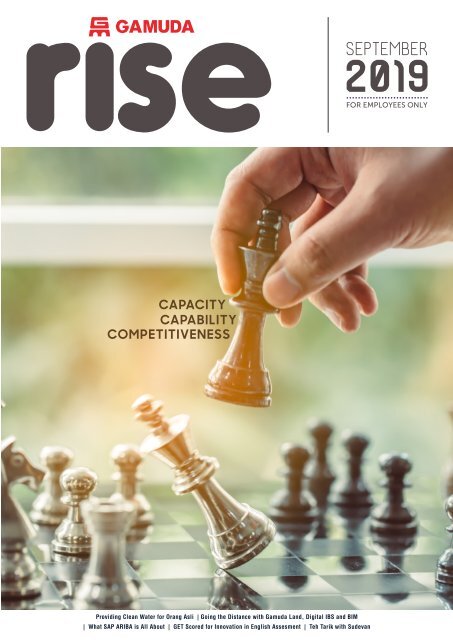
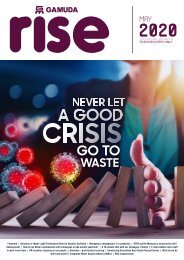
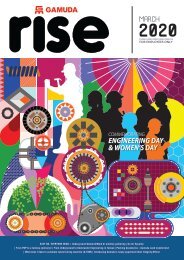
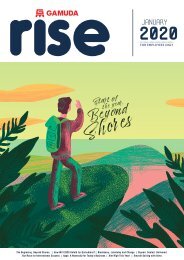
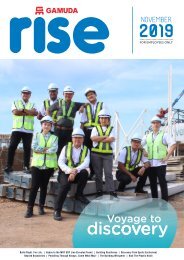
![[Exhibit 6] Tunnelling Virtual Reality Walk](https://img.yumpu.com/62890814/1/184x260/exhibit-6-tunnelling-virtual-reality-walk.jpg?quality=85)
![[Exhibit 2] Autonomous Tunnel Boring Machine](https://img.yumpu.com/62883468/1/190x107/exhibit-2-autonomous-tunnel-boring-machine.jpg?quality=85)
![[Exhibit 1] Tunnelling Centralised Command Control Centre (TC4) Statistics](https://img.yumpu.com/62879681/1/190x107/exhibit-1-tunnelling-centralised-command-control-centre-tc4-statistics.jpg?quality=85)
